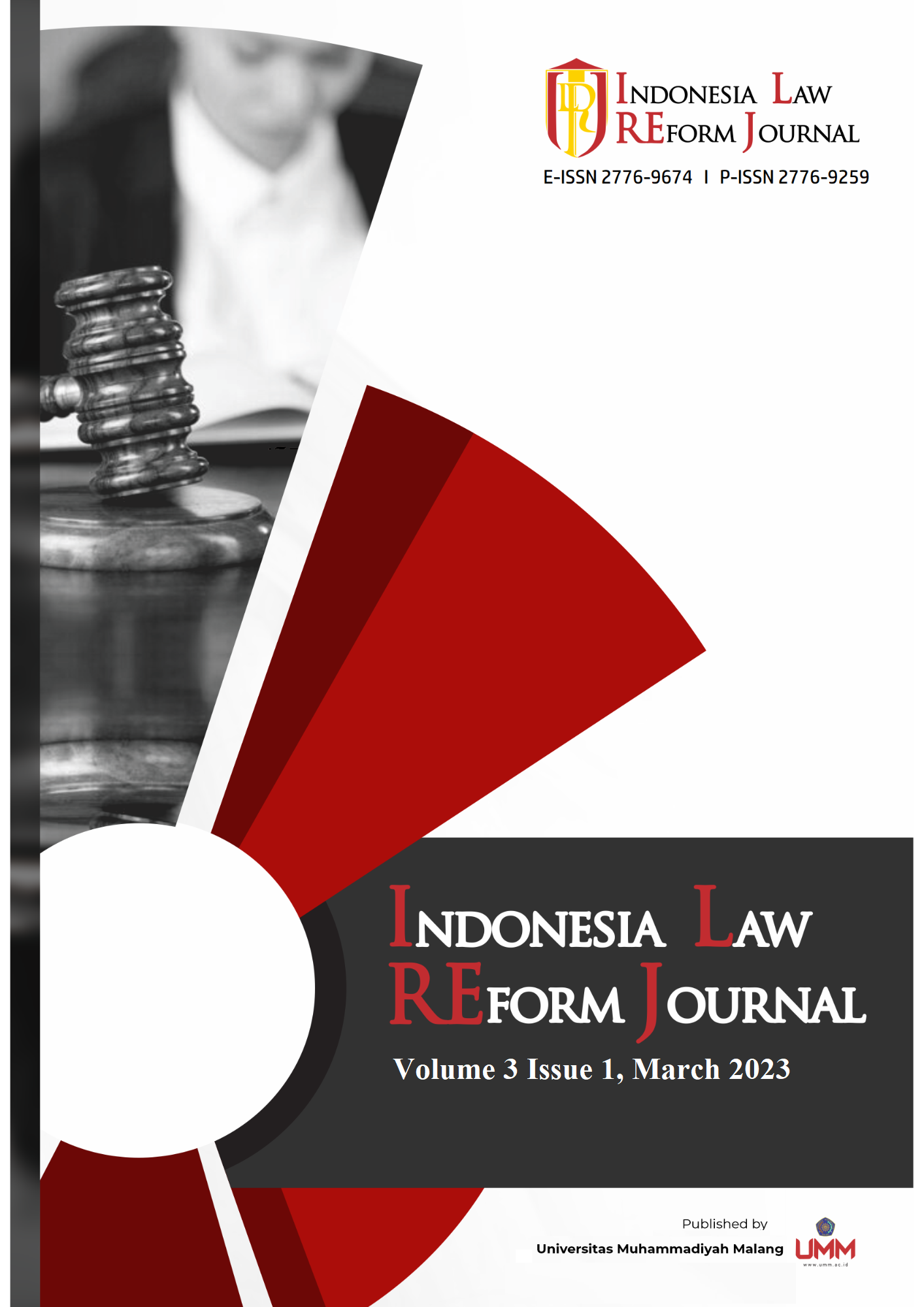Asset Forfeiture of Corruption Proceeds Using the Non-Conviction Based Asset Forfeiture Method: A Review of Human Rights
DOI:
https://doi.org/10.22219/ilrej.v3i1.24496Keywords:
Non-Conviction Based Asset Forfeiture, Corruption, Criminal CodeAbstract
Abstract
One of the state's efforts to eradicate corruption is to draw up a Bill on Asset Write-off, in which there is the regulation regarding the concept of Non-Criminal-Based Asset Write-off, which this concept can be called "Writing Without Punishment". The purpose of this writing is to find out how the concept of Non-Conviction Based Asset Forfeiture "Forfeiture Without Criminalization" can overcome corruption cases. Then to know how the human rights of the perpetrators whose assets are seized all by the state, doesn't every human being have the right to defend what they are entitled to. The method used by the author is the normative juridical method. These things are the general description of In this study, it was concluded that "Non-Conviction Based Assets" Forfeiture (NCB)" in the case of confiscation of assets resulting from criminal acts of corruption intends to maximize efforts to restore / recover assets (asset recovery) for state treasury losses are for the benefit of justice with the whole community, and the mechanism does not violate Human rights are based on the barrier between the rights to property as defined regulated in "Article 28G of the 1945 Constitution of the Republic of Indonesia.
Keywords: Non-Conviction Based Asset Forfeiture; Corruption; Criminal Code.
Abstrak
Salah satu upaya negara memberantas korupsi adalah dengan lahirnya Rancangan Undang-undang Penghapusan Aset, yang didalamnya terdapat pengaturan mengenai konsep Penghapusan Aset Berbasis Non-Pidana yang konsep ini dapat disebut dengan "Penghapusan Tanpa Hukuman". Tujuan dari penulisan ini adalah untuk mengetahui bagaimana konsep Penghapusan Aset Berbasis Non-Pidana "Penghapusan Tanpa Kriminalisasi" dapat mengatasi kasus korupsi. Kemudian untuk mengetahui bagaimana hak asasi manusia dari pelaku yang asetnya disita seluruhnya oleh negara, bukankah setiap manusia berhak membela apa yang menjadi haknya. Metode yang digunakan oleh penulis adalah metode yuridis normatif. Hal-hal tersebut merupakan deskripsi umum dalam penelitian ini, dinyatakan bahwa "Penghapusan Aset Berbasis Non-Pidana" dalam kasus penghapusan aset yang dihasilkan dari tindakan kejahatan korupsi bermaksud memaksimalkan upaya untuk memulihkan / mengembalikan aset (pemulihan aset) untuk kerugian kas negara demi kepentingan keadilan bersama masyarakat, dan mekanisme tersebut tidak melanggar hak asasi manusia yang didasarkan pada penghalang antara hak atas properti yang diatur dalam "Pasal 28G Undang-Undang Dasar Negara Republik Indonesia Tahun 1945".
Kata kunci: Non-Conviction Based Asset Forfeiture; Korupsi; Hukum Pidana.
Downloads
References
Anindito, Lakso. “Lingkup Tindak Pidana Korupsi Dan Pembuktian Kesalahan Dalam Sistem Pertanggungjawaban Pidana Korporasi Di Indonesia, Inggris, Dan Prancis.” INTEGRITAS 3, no. 1 (March 6, 2017): 1–29. https://doi.org/10.32697/integritas.v3i1.138.
Greenberg, Theodore S., Linda Samuel, Wingate Grant, and Larissa Gray. Stolen Asset Recovery. The World Bank, 2009. https://doi.org/10.1596/978-0-8213-7890-8.
Hapsari, Sulvia Triana, Abdul Madjid, and Nurini Aprilianda. “Confiscation Of Assets In Economic Crime.” Audito Comparative Law Journal (ACLJ) 3, no. 2 (September 28, 2022): 31–43. https://doi.org/10.22219/aclj.v3i2.22185.
Jaya, Arizon Mega. “Implementasi Perampasan Harta Kekayaan Pelaku Tindak Pidana Korupsi (Implementation of Asset Deprivation of Criminal Act of Corruption).” Cepalo 1, no. 1 (September 12, 2019): 21. https://doi.org/10.25041/cepalo.v1no1.1752.
King, Colin. “Using Civil Processes in Pursuit of Criminal Law Objectives: A Case Study of Non-Conviction-Based Asset Forfeiture.” The International Journal of Evidence & Proof 16, no. 4 (October 1, 2012): 337–63. https://doi.org/10.1350/ijep.2012.16.4.411.
Maguchu, Prosper. “Borders and Boundaries: Importing Asset Recovery ‘Duty Free’ in Transitional Justice Processes.” Indonesian Journal of International Law 17, no. 2 (January 31, 2020). https://doi.org/10.17304/ijil.vol17.2.784.
Mapuasari, Supeni Anggraeni, and Hadi Mahmudah. “Korupsi Berjamaah: Konsensus Sosial Atas Gratifikasi Dan Suap.” Integritas : Jurnal Antikorupsi 4, no. 2 SE-Articles (December 10, 2018): 159–76. https://doi.org/10.32697/integritas.v4i2.279.
Oduor, Jacinta Anyango, Agustin Flah, Dorothee Gottwald, and Jeanne M Hauch. Left Out of the Bargain: Settlements in Foreign Bribery Cases and Implications for Asset Recovery. World Bank Publications, 2014.
PRIYATNO, Dwidja. “Non Conviction Based (NCB) Asset Forfeiture for Recovering the Corruption Proceeds in Indonesia.” Journal of Advanced Research in Law and Economics; Vol 9 No 1 (2018): JARLE Volume IX Issue 1(31) Spring 2018, 2018. https://doi.org/10.14505//jarle.v9.1(31).27.
Saputra, Refki. “Tantangan Penerapan Perampasan Aset Tanpa Tuntutan Pidana (Non-Conviction Based Asset Forfeiture) Dalam RUU Perampasan Aset Di Indonesia.” Integritas : Jurnal Antikorupsi 3, no. 1 SE-Articles (March 6, 2017): 115–30. https://doi.org/10.32697/integritas.v3i1.158.
Shehu, Abdullahi Y. “Key Legal Issues and Challenges in the Recovery of the Proceeds of Crime: Lessons from Nigeria.” International Law Research 3, no. 1 (October 30, 2014). https://doi.org/10.5539/ilr.v3n1p186.
Sri Handayani Retna Wardhani, Nita Ariyani, and Paryadi. “Tindak Lanjut Penuntasan Kasus Korupsi Mendiang Presiden Soeharto Dalam Rangka Mewujudkan Cita-Cita Reformasi.” Kajian Hukum 7, no. 1 (May 20, 2022): 103–15. https://doi.org/10.37159/kh.v7i1.9.
Svensson, Jakob. “Eight Questions about Corruption.” Journal of Economic Perspectives 19, no. 3 (August 1, 2005): 19–42. https://doi.org/10.1257/089533005774357860.
Wicaksana Prakasa, Satria Unggul, Achmad Hariri, Ida Nuriyah, Asis Asis, and Idrus Salam. “Social Aid of Covid-19 Corruption: Strategy and Mitigation Policy of Muhammadiyah East Java.” Legality : Jurnal Ilmiah Hukum 29, no. 1 (February 2, 2021): 27–45. https://doi.org/10.22219/ljih.v29i1.15127.
Wijayanto, Wijayanto. “From Instrument to Agent: The Metamorphosis of Media’s Role in Curbing Corruption in Indonesian Politics (Case Study on the Incident of Corruption By Kendal Regent Hendy Boedoro, Kendal Regency, Central Java Province 2005-2006).” Politika: Jurnal Ilmu Politik 3, no. 1 (2012): 104–16. https://doi.org/http://dx.doi.org/10.31845/jwk.v15i1.276.
Wilhelmus, Ola Rongan. “KORUPSI: TEORI, FAKTOR PENYEBAB, DAMPAK, DAN PENANGANANNYA.” JPAK: Jurnal Pendidikan Agama Katolik 17, no. 9 (November 5, 2018): 26–42. https://doi.org/10.34150/jpak.v17i9.44.
Ziouvas, Dimitris. “International Asset Recovery and the United Nations Convention Against Corruption BT - The Palgrave Handbook of Criminal and Terrorism Financing Law.” edited by Colin King, Clive Walker, and Jimmy Gurulé, 591–620. Cham: Springer International Publishing, 2018. https://doi.org/10.1007/978-3-319-64498-1_25.
Downloads
Published
How to Cite
Issue
Section
License
Copyright (c) 2023 Wulandari, Wasis Suprayitno, Kukuh Dwi Kurniawan, Merve Özkan Borsa

This work is licensed under a Creative Commons Attribution-ShareAlike 4.0 International License.











